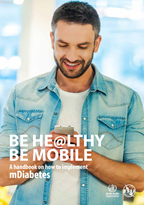Be He@lthy, Be Mobile (BHBM)
The use of mobile and wireless technologies has the potential to transform the face of health service delivery across the globe. There are reportedly more than 7 billion mobile telephone subscriptions across the world, over 70% of which are in low- or middle- income countries. In many places, people are more likely to have access to a mobile telephone than to clean water. As a global society, we are also facing a looming threat of noncommunicable diseases (NCDs), which kill 41 million people each year, around 71% of all deaths.
To address this challenge, the Be He@lthy, Be Mobile (BHBM) initiative was set up by the World Health Organization (WHO) and the International Telecommunication union (ITU) in 2012. BHBM works with governments to scale up targeted client communication messaging services for NCDs and their risk factors. Millions of people have already been reached through the programmes and evaluation shows that they are impacting positively on users’ health.
The approach is designed to be scalable: instead of promoting specific products, it provides cross-cutting health content and technical support which can be used and incorporated into other services and applications. It also works to develop the broader ecosystem, helping ensure that the messaging service and content of each health programme is integrated and reinforces other health services. In doing so, each programme becomes a sustainable part of the health system whilst also helping to promote health and wellbeing around the world.
The initiative’s immediate objective is to continue expanding the number of countries it works with and the variety of diseases it addresses.










